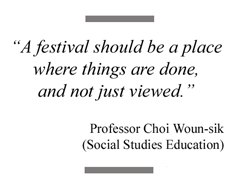"I remember being high from night cherry blossoms, makkoli, (raw rice wine), and "ssang-ssang" (twosome) parties, recalls Professor Choi Woun-sik, (Department of Social Studies Education), of his college years, when he and his classmates of Seoul National University were invited to a joint festival with Ewha students. "We weren't used to large gatherings back then, so we couldn't help but feel a little awkward. I regret to say that our participation in festivals continued for only two to three years, because soon all types of collegian gatherings were suspected of being anti-government."
Professor Choi's outlook on school festivals have changed somewhat from those early years, also. "Before, I thought festivals simply provided pure enjoyment. I would eat, drink, and chatter away without putting much thought into it, but after the show was over, all that would be left was chaos and waste. Now, I realize that it's much more than that; it? a place that needs order and etiquette, it should differ from the average festival where you just drink and eat; a place where something is done, and not just viewed."
Today, after seconhand observations as a student from another university, and then 24 years of seeing the transitions in Ewha's May Festival firsthand, Professor Choi analyzes it from a teacher's perspective. "It is active now rather than passive, which is a positive sign that reflects the changing times. However, it has become more focused on inviting celebrities and watching stage performances rather than on student participation. Also, I feel as though the festival is starting to repeat itself yearly, and needs something to distinguish it from festivals at other schools around the country."

He adds a note of encouragement to students for Ewha's May Festival. "Being a women's college may have some limits, but I believe that the time has come for Ewha to do what co-ed schools cannot do. In this globalizing era, distinction is a key necessity. Ewha shouldn? be imitating society; in fact I'd like to see the opposite happen."
As a closing comment, Professor Choi ends his thoughts on festivals with high hopes for the future of college festivals. "Festivals are a precious tradition passed down from the Agricultural Age. It was a time granted for villagers to dance, sing and perform talent shows to bid good fortune and wishes for plentiful harvest. It is our duty now to graft this age-old custom with modern trends and create a new kind of tradition for festivals, traditional yet unprecedented. It should go beyond eating and drinking, and I believe college is the only place where that can happen."

